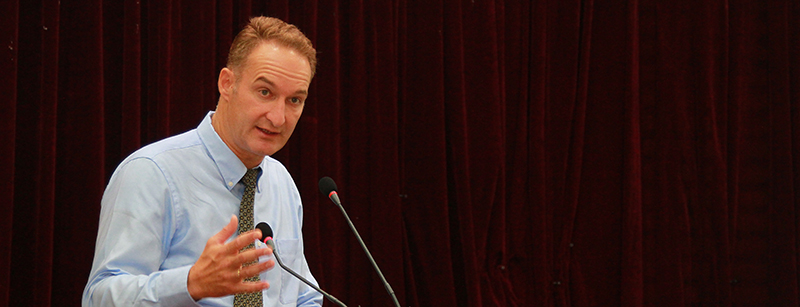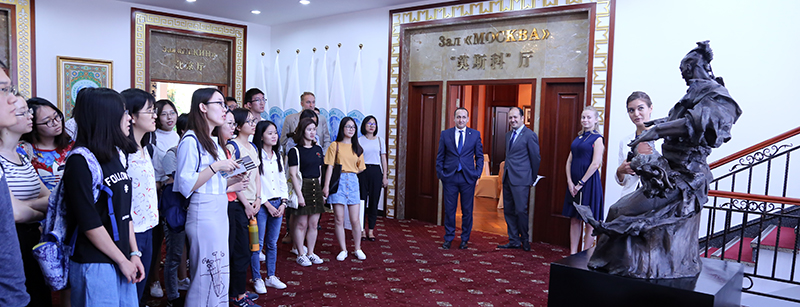To celebrate the 70th anniversary of the founding of the China University of Political Science and Law (CUPL), to pass on the vibrant culture and spirit of CUPL, and to highlight the characteristics of training international legal talents, the China-EU School of Law (CESL) launched the ‘CESL Featured Courses Series’, an introduction to some featured courses from CESL.
The course "International Organizations" is one course of the first module "Public International Law and Human Rights" of the CESL programme of Master of European and International Law (LL.M.). It is taught by Professor Alexis Vahlas of the University of Strasbourg, France. Professor Vahlas has been teaching the course International Organization at CESL since 2015. In 2017, He once contacted the Shanghai Cooperation Organisation Secretariat and organised a visit there for the CESL students.

Professor Alexis Vahlas at CESL in 2017
Professor Vahlas divides the course “International Organisations” into three topics. The first is the diversity and legal status of international organisations. The second is about two specific international institutions: the United Nations and the European Union. The last is about the view that interagency cooperation is the new international modus operandi.

Professor Alexis Vahlas and CESL students at the Shanghai Cooperation Organisation Secretariat in 2017
In the first topic, Professor opened by telling the students that there are currently more than 200 international organisations in the world, more than the number of states. After arousing the students' interest, Professor began to explain the international organisations that have been created either on the basis of geographical solidarity, cultural solidarity or political solidarity. Among them, a large number of international organisations on the European continent are very representative of those based on geographical solidarity.
The diversity of international organisations is not only reflected in the number, but also in their internal organisational structures. However, despite the diversity, international organisations generally have many commonalities: they are mostly established by a treaty; they are mostly intergovernmental organisations; and their access mostly requires both substantive and procedural conditions. In terms of legal status, although they function as granted, some international organisations, such as the United Nations and the European Union, are able to create binding legal instruments. In addition, international organisations do not have immunity from international justice. NATO was investigated by the International Criminal Tribunal for the former Yugoslavia.
In the second topic, Professor began with the United Nations. The topic was structured around the UN Charter, access, the main UN bodies and their competences. The priority of Charter obligations, the competence of the UN General Assembly, the competence of the UN Security Council and its reform were the main points. Professor also answered a question about the distinction between specialised agencies and related organisations. In the following lecture on the European Union, Professor gave an overview of the EU from its origins to Brexit. The success of European regional integration was acknowledged, but the question was raised as to whether Europe was moving towards a "multi-speed" Europe. One of the most impressive points was the presentation on the four main institutions of the EU (see below). This not only clarified the relationships within the EU, but also enabled the students to distinguish it well from the Council of Europe.

In the final topic, Professor began with the theories on the cooperation models of international organisations, and concluded that the comprehensive approach is now being supported. He then presented the EU’s different models of cooperation with the UN, the African Union, and NATO. Fighting against piracy in Somalia is a good example. Although the models of cooperation have changed from the previous ones, cooperation between international organisations still needs to be developed. The course came to an end with the professor's conclusion.
Although the lectures were only available online due to the pandemic, the interaction between students and Professor remained active. We hope that the pandemic will soon be over and offline teaching will resume, allowing more communication between teachers and students.
Welcoming the 70th Anniversary of CUPL: CESL Featured Courses Series
Welcoming the 70th anniversary of CUPL: Showcasing CESL course on "The European Union: from its origins to Brexit"
Welcoming the 70th anniversary of CUPL: Showcasing CESL course on "International Business Law"
Welcoming the 70th Anniversary of CUPL: Showcasing CESL course on "Legal Research and Writing"
Welcoming the 70th Anniversary of CUPL: Showcasing CESL course on "Legal Foundations of Public International Law"
Welcoming the 70th Anniversary of CUPL: Showcasing CESL course on "International Dimension of Human Rights"
Written by: Qiao Luting, CESL double master student from 2020 intake
